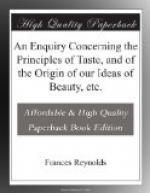Taste is intellectual pleasure, an approving sense of truth, of good, and of beauty. The latter seems the visible or ostensible principle of the two former, and is that in which the universal idea of taste is comprised. All are pleased with the sight of beauty; but all are by no means sensible that the principles that make it pleasing, that constitute a form beautiful, are those, or, to be more intelligible, relate to those, that constitute man’s highest excellence, his first interest, his chief good. Few, indeed, even among those who possess taste, if they have not accustomed themselves to investigate its principles, will readily conceive that they are thus deeply rooted in the mental frame. Indeed, the generality of mankind seem rather to think that taste has no principles at all, or, if any, that they begin and end with the prevailing mode, fashion, &c. of the times; a notion which, though in the highest degree absurd, corroborates my opinion, that the universal perception of taste (the true and the false) exists in the idea of honour.
The compound word, or phrase, le vrai ideal, universally adopted to denote an object of taste, is the most exact and literal definition of its sentiment that can be conceived; for it implies the union of the judgement and the imagination, without which there could be no sentiment of taste. The judgement, as I observed, perceives the truth of the object, the imagination its beauty; they may be said to relate to each other, in the perception of an object of taste, as a luminous polish does to the substance from whence it proceeds: the substance can exist without its polish, but the polish cannot exist without its substance. The perception of taste seems to me, if I may so express myself, to be illusive, but not erroneous; in a word, to exist in our idea of true honour, i.e. in the polish, lustre, or ornament, of true virtue.
As the universal idea or sentiment of taste is honour, so the universal object of its perception is ornament, from the object, whose excellence we contemplate as an ornament or honour to human nature, to every object which in the slightest degree indicates the influence of that excellence. Take away the idea of that influence in the moral sphere, and taste is annihilated; and, in the natural sphere, take away the idea of divine influence, and taste cannot exist. Every sentiment of taste, as I observed before, ultimately relates to the one or to the other of these principles; indeed, strictly speaking, as the moral relates to the divine, it may be said ultimately to do the same.




